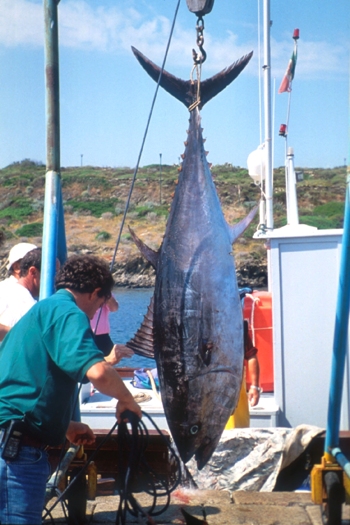A proposal to totally ban the trade in the Critically Endangered Atlantic bluefin tuna failed at the Convention on International Trade in Endangered Species (CITES), surprising many who saw positive signs leading up to the meeting of a successful ban.
“Today’s CITES committee vote not to protect Atlantic bluefin tuna is an unfortunate step backwards. This deeply disappointing and irresponsible vote signals a bleak future for this iconic fish,” Susan Lierberman, director of international policy for the Pew Environment Group, said following the vote.
Despite the fact that the Atlantic bluefin population has plummeted 80 percent since 1970, only 20 nations voted for a ban. Sixty eight countries voted against a ban—including Japan and Canada—while 30 abstained. The Atlantic bluefin tuna is currently classified by the IUCN red list as Critically Endangered, and an all-out ban has repeatedly received the support of international scientists.
 The bluefin tuna. Photo courtesy of NOAA. |
“This meeting presented a golden opportunity for governments to take a stand against overfishing, and too many governments failed to do so. The Atlantic bluefin tuna will not receive the protections of a suspension in international trade that it so desperately needs. The market for this fish is just too lucrative and the pressure from fishing interests too great, for enough governments to support a truly sustainable future for the fish,” Lierberman says.
Japan, which consumes three-quarters of the bluefin trade, lobbied hard against the ban. Bluefin tuna is lucrative business: estimated at 7.2 billion US dollars a year. In fact, a single fish can sometimes sell for over 100,000 US dollars at the Tokyo Market.
Protection of the Atlantic bluefin tuna now goes back to the International Commission for the Conservation of Atlantic Tunas (ICCAT), which has faced fierce criticism for its continuing unwillingness to place more strident measures on the trade.
Last year, ICCAT scientists called for a total suspension of fishing stating that the Atlantic bluefin tuna’s spawning biomass is less than 15 percent of its original stock before industrial fishing. Instead of following their scientists’ advice, ICCAT set a quota of 13,500 tons.
“Today’s vote puts the fate of Atlantic bluefin tuna back in the hands of the International Commission for the Conservation of Atlantic Tunas (ICCAT), the very body that drove the species to the disastrous state it is now in,” Lierberman says.
According to The Economist, the evening before the vote, meeting members took part in a reception at the Japanese embassy where bluefin tuna sushi was conspicuously served.
Related articles
Sushi lovers may be eating Critically Endangered species without knowing it
(11/24/2009) Restaurants sampled in New York and Colorado are serving up bluefin tuna without informing their customers know they are dining on an endangered species, according to a new study in PLoS ONE. Using DNA barcoding researchers from the Sackler Institute for Comparative Genomics at the American Museum of Natural History found that nearly a third of tuna sampled in one restaurant in Colorado and thirty restaurants in New York served bluefin tuna, and nine of the restaurants did not label the tuna as bluefin.
ICCAT fails to protect critically endangered tuna—again
(11/15/2009) The International Commissions for the Conservation of Atlantic Tuna (ICCAT) ignored the advice of its scientists to end fishing of the Atlantic bluefin tuna. Instead ICAAT set a quota of 13,500 tons of fish. This is not the first time ICCAT has flouted its own researchers’ advice: it has repeatedly set quotas well-above its researchers’ recommendations.
Atlantic bluefin tuna should be banned internationally: ICCAT scientists
(10/29/2009) Scientists with the International Commission for the Conservation of Atlantic Tuna (ICCAT) have said in a new report that a global ban on Atlantic bluefin tuna fishing is justified. ICCAT meets in November to decide if they will follow their scientist’s recommendations.
Global fisheries begin to show signs of recovery where management is strong
(07/30/2009) New research reveals hopeful signs that overfished marine ecosystems can recover provided adequate protections. The two-year study, publish in the journal Science, found that efforts to reduce overfishing are beginning to succeed in five of the ten large marine ecosystems examined, suggesting that “sound management can contribute to the rebuilding of fisheries.”
Marine scientist calls for abstaining from seafood to save oceans

(06/08/2009) In April marine scientist Jennifer Jacquet made the case on her blog Guilty Planet that people should abstain from eating seafood to help save life in the ocean. With fish populations collapsing worldwide and scientists sounding warnings that ocean ecosystems—as edible resources—have only decades left, it is perhaps surprising that Jacquet’s call to abstain from consuming seafood is a lone voice in the wilderness, but thus far few have called for seafood lovers to abstain.
Sushi restaurant, Nobu, warns patrons not to eat bluefin tuna, but serves it anyway
(05/27/2009) Last year, Nobu was caught red-handed serving critically-endangered bluefin tuna to patrons, even after servers claimed its tuna was not bluefin. Now after heavy criticism, the trendy restaurant, owned by Robert DeNiro and popular with celebrities, has finally taken action.
Turkey ignores bluefin tuna quotas, further imperiling critically-endangered species
(05/12/2009) A few weeks into the bluefin tuna fishing season and Turkey has decided to go it alone. Breaking international agreements, the Turkish government has announced that it will ignore agreed-upon bluefin tuna quotas. The news is not good for the survival of the critically-endangered fish species, since Turkey operates the largest Mediterranean fleet for bluefin tuna.
Mediterranean bluefin tuna has only three years left unless fishery closes
(04/14/2009) If the Mediterranean bluefin tuna fishery is not closed, the bluefin will be functionally extinct by 2012 according to a new analysis from World Wildlife Fund (WWF). While the population has undergone steep declines for over a decade, fishery managers and policy-makers have continually ignored calls from scientists that fishing must stop if the Mediterranean bluefin tuna is to survive.